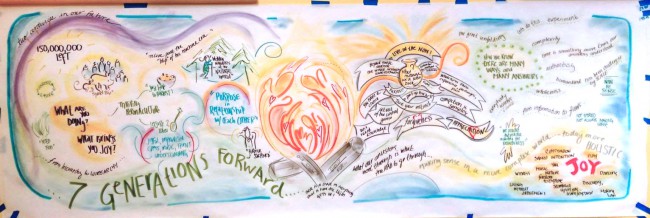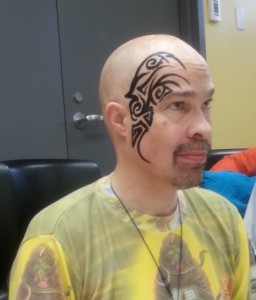
Last weekend in Montréal I piloted a new session entitled Seven Generations from Now: A Collective Improv. The invitation for the event was as follows:
Welcome, friend! Sit with me in this circle around the campfire, in these early days of the 23rd century CE. (You are your own great-great-great-great-great grandchild.) The two-century Long Emergency has finally wound down. There are only about 150 million humans left now, they tell us, and much of our planet is too hot to be inhabitable. The weather’s still wild but at least we managed to get all the nukes decommissioned. We live a much simpler, relocalized, neo-tribal life now, with the only real technology scavenged for essential medical and shelter purposes. But life is good, here on the banks of this ancient river. So, tell me, friend, how are you doing and what brings you joy these days?
Nancy White did a wonderful job of graphic recording the event (see above; click here to see a larger version), and local artist Elissa Baltzer did tribal face painting for the participants (see her amazing work on Flemming Funch, below).
 The idea of the event was to find a way to move past the dread and grief and shame of civilization’s collapse, and to imagine together how much better life might be for our descendants after civilization is gone and forgotten. Choosing seven generations (200 years) is taking a bit of poetic licence, since civilization took seventy generations to ruin our planet, and it will likely take that long to recover fully from it. And human population in two millennia is likely to be much less than 150 million, for all kinds of complex reasons. But you get the idea.
The idea of the event was to find a way to move past the dread and grief and shame of civilization’s collapse, and to imagine together how much better life might be for our descendants after civilization is gone and forgotten. Choosing seven generations (200 years) is taking a bit of poetic licence, since civilization took seventy generations to ruin our planet, and it will likely take that long to recover fully from it. And human population in two millennia is likely to be much less than 150 million, for all kinds of complex reasons. But you get the idea.
The Seven Generations meme comes from some First Nations beliefs that it is our responsibility to ensure the world we leave our descendants seven generations from now is (at least) as healthy as the one we live in ourselves. Joanna Macy does an exercise in which half of the participants speak with their descendants seven generations from now, as part of her grief and despair training for those who see civilization’s collapse as inevitable. But its principal purpose is to seek solace in forgiveness. My intent is instead to help us move past our addiction to civilization by seeing that what our descendants will inherit after its demise will be wondrous, magical, much better than the crumbling, sick, overcrowded world we’re struggling with.
Unfortunately, quite a few of the participants couldn’t get into it. Some couldn’t get past thinking about how we would get there or what collapse was like, instead of leaving it behind. Others just couldn’t, or wouldn’t, or didn’t believe that collapse would occur at all, or at least was inevitable (although there were 12 attendees at the session from the Dealing With Collapse facebook group, most of them are still making their minds up about if and/or how collapse will unfold). One of the participants, Juan Carlos Londono (who also, incidentally, has spearheaded a French language translation of Group Works), jumped into the fray in true improv fashion and brilliantly modelled what an imaginative improv collaboration looks like, making up new 23rd century words and inventing a whole social texture for the brave new culture. By then we were near the end of our time, so while it was a wonderful practice and learning experience for me, it was likely less than satisfactory for the struggling participants. I thank them for their bravery and patience!
I still think the idea has merit, and I intend to keep trying it. I am confident that, had I tried this out on my Dark Mountain colleagues in Totnes last year, it would have been quite amazing (they tend to be full-blown collapsniks, and as artists have the improv gene in them as well).
Here’s what I will do differently next time:
- Learn more about improv by actually taking a course in it. There’s a major Applied Improv Network conference in Montréal in September. And a Core course curriculum offered frequently in Vancouver.
- Hand pick a few people with both improv skills and a knowledge of what the future likely holds for us, and try it with them first. Even if we have to do it by Skype. I’m becoming very aware that good writers are not necessarily good conversationalists, and vice versa (more about that in my next post).
- Set the lofty goal of using the improv experiences as the raw material for a play set seven (or seventy) generations in the future, perhaps co-written with my fellow actors. Perhaps not written at all — just performed in the nature of the griots and minstrels of pre-Gutenberg times.
I think we need this. We need to think about the future with joy and not just dread. We need to imagine a life better than is even possible today, for our own good and for our descendants. This might be a start.





It would be interesting to reach out to all the participants and see what they thought/felt/experienced. I think you may be reading disappointment into a space where there was not disappointment. But I’m not sure. I really enjoyed it and enjoyed flowing w/ it visually!
One of the many things I appreciate about howtodavetheworld is that you tell it even if it didn’t work out. The idea of improv-ing this “remains of the human race” reminds me of the Joanna Macy exercises where you talk to a future being about how their life is, and they thank you for the small efforts that you made in the face of the relentless opposition. Even a fish-bowl type set up would be interesting to try. With a series of questions asked in a round like what do you do all day and what do you enjoy most…
I think the experiment worked out well, and I’m happy I was there. Yeah, not everybody found it equally easy to go with and actually play the game. And there were right away different views about what the reality was. But I think that actually made it a more rich experience.
I feel much the same as Nancy and Flemming. That we were all over the place in our ability and or willingness to plunge into the moment as though we were actually living it made for a fascinating range of perspectives, feelings, and reflections to surface. It makes sense to me that some of us were wanting to analyze how we had arrived at where we were by looking back through the past and others were gnawing on that giant squirrel of Sam’s as we experienced the moment and still others looked forward. Isn’t it always thus with humans?
Thanks for the experiment, Dave. I’d do it again!
Agreed – it was a wonderful experiment and a rich experience. I benefited from it and felt the widening of possibility that the future could actually evolve to be bright and better, not dark and worse.
Dave, if you are looking to get people more into the frame you propose and in an improv state of mind, I’d suggest just a tiny bit more set up at the beginning to allow and enable people to acknowledge and release their own perceptions and anxieties, even though it will break character. Maybe you stand and do this and then come to the fire as the “in character” piece starts. Or have aposter inviting the suspension of calamitous views. Just a thought, but maybe a quick visualization/NLP moment something like… “Close your eyes and think about the future – the distant future – of mankind. In our own time we see the challenges humanity is facing; we know life on earth is at risk. Take a moment to breathe and acknowledge negative perceptions, anxieties, guilt and worries you may have about the future. I want you to consciously place those aside. I want to invite you into an alternative scenario… (intro)”
I’ve also found in doing improv work with groups that sometimes it helps to introduce special language. i.e. model the “23rd century tradition” of ending a campfire story with “hapa leo” (which happens to mean “here today” in Swahili), or introduce a word for the divine like Juan Carlos did (did he say “George”?) to seed the environment with a flavour of the new time.
Thanks so much for devising such an ingenious experience for us!
This is something I would really like to participate in…not that I have any improvisational skills…but its a type of thinking I really want to engage in with others…
Fascinating comment from Mike Marinos came in after comments closed: